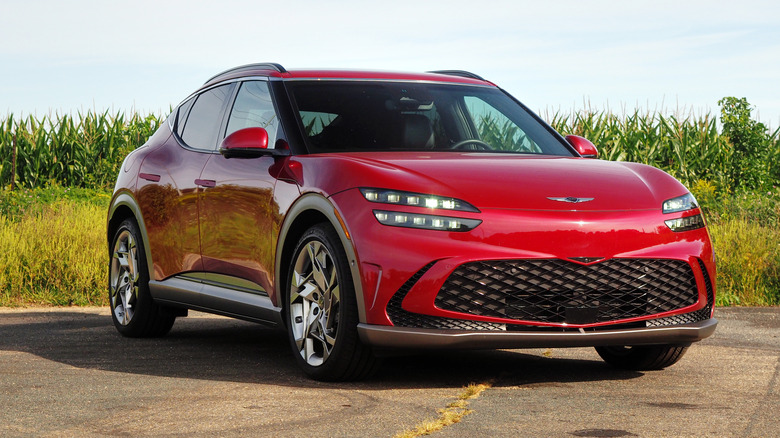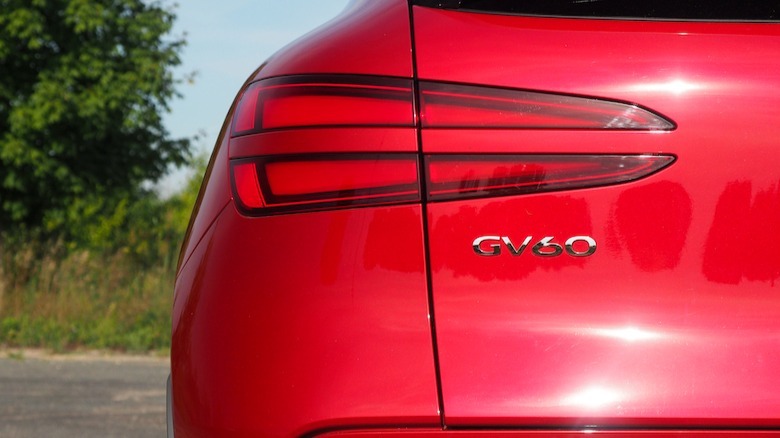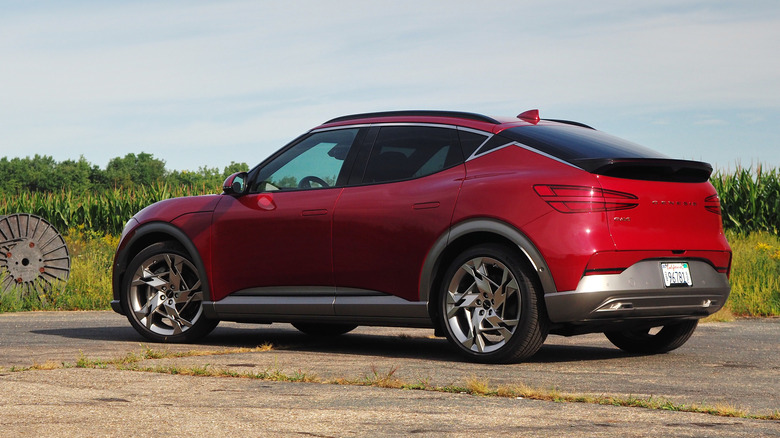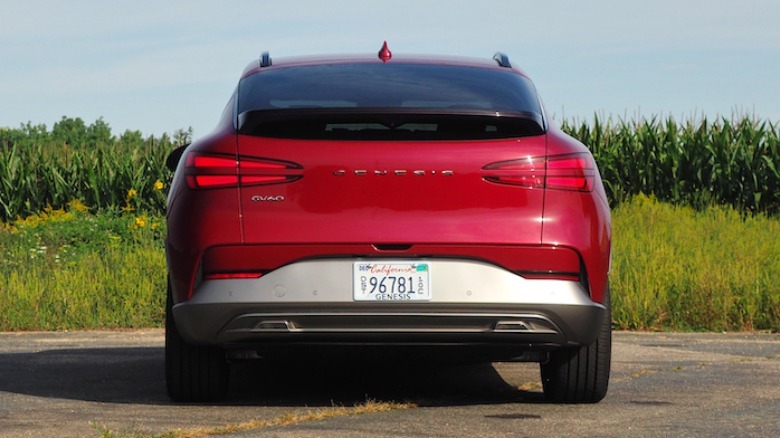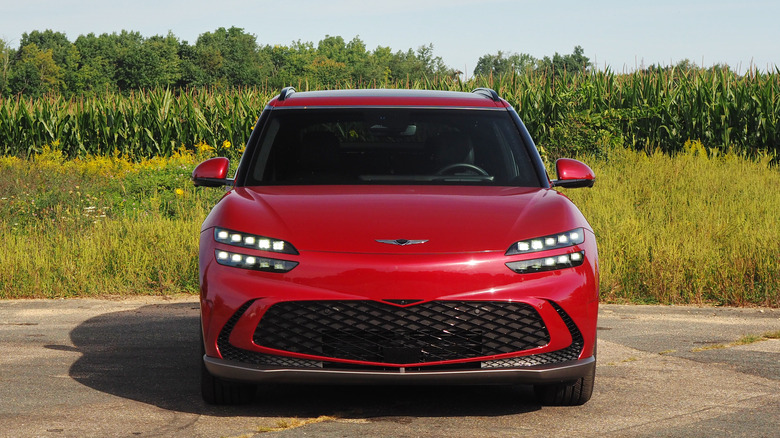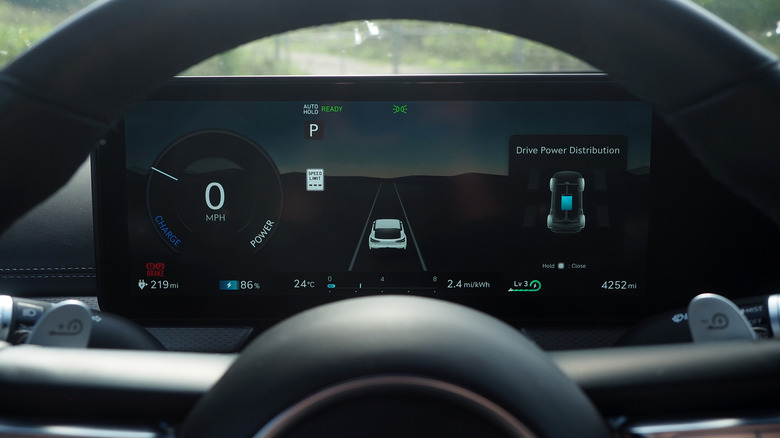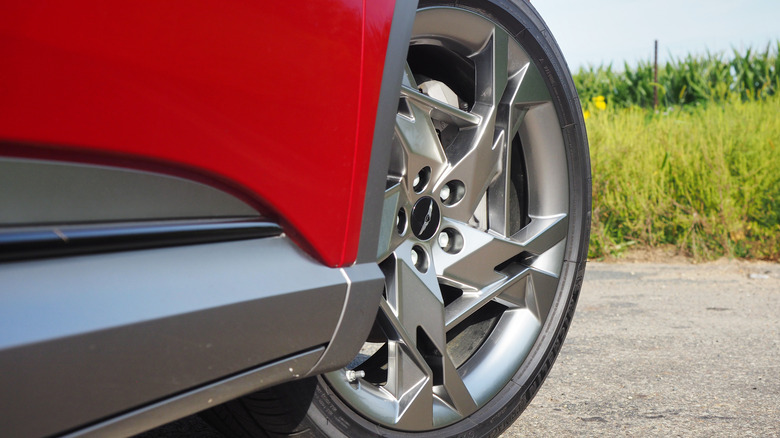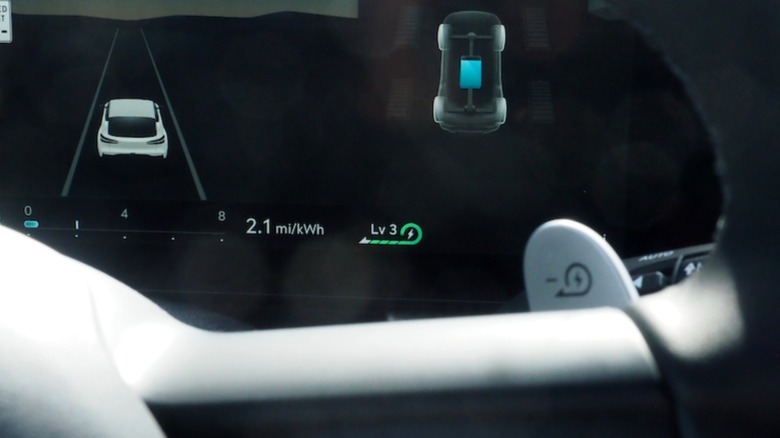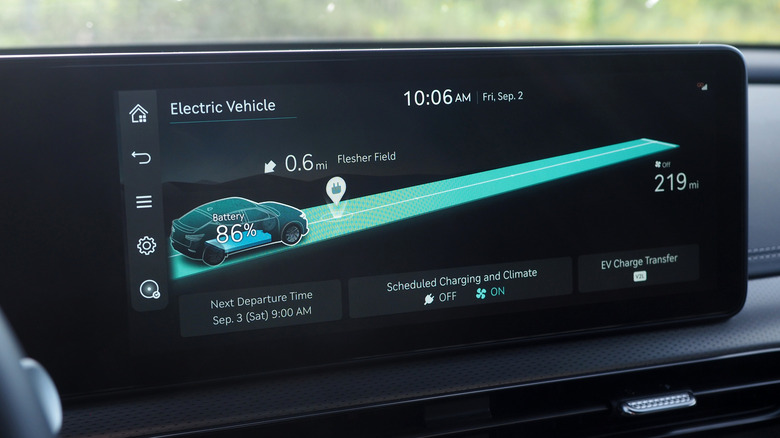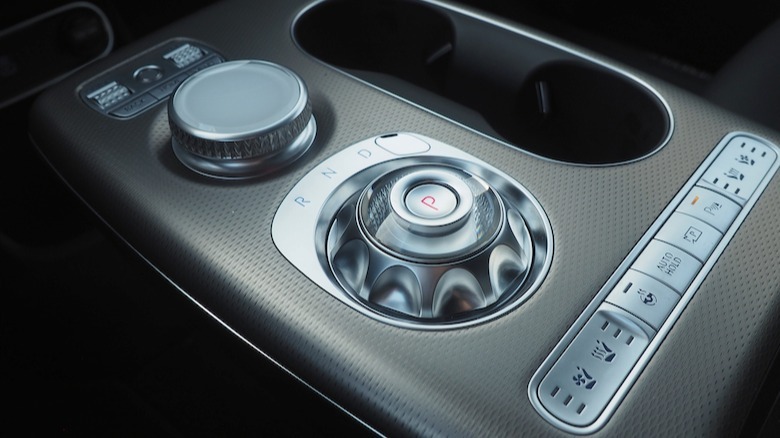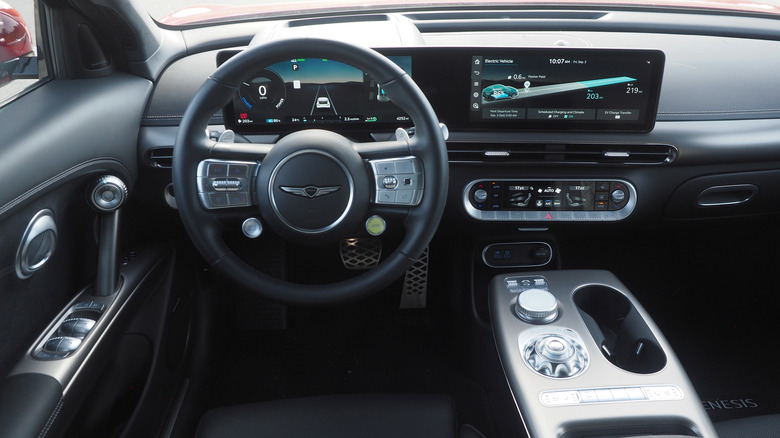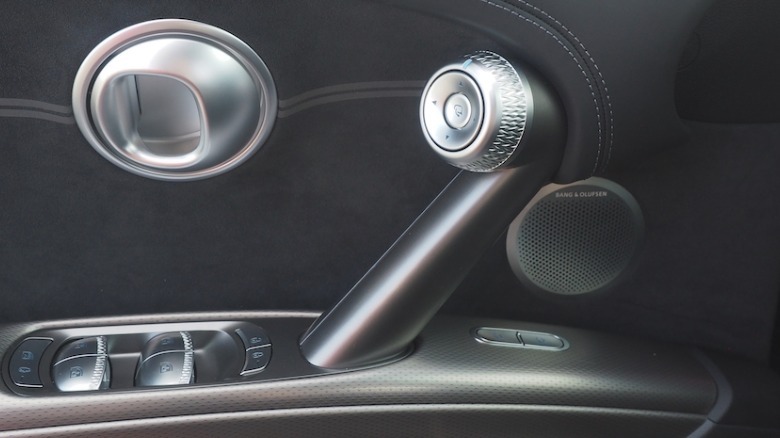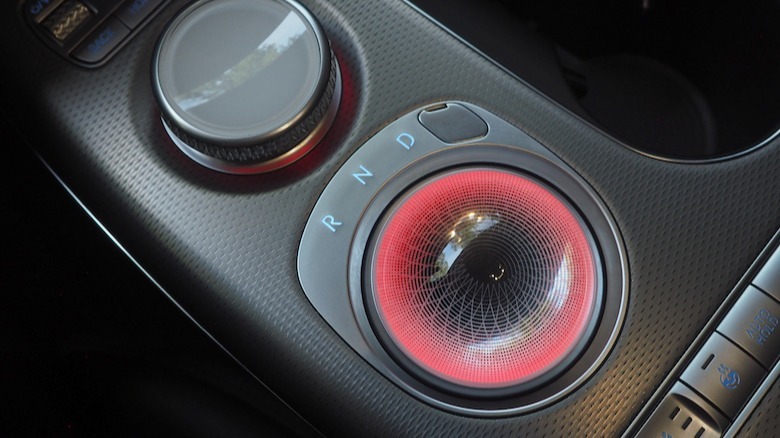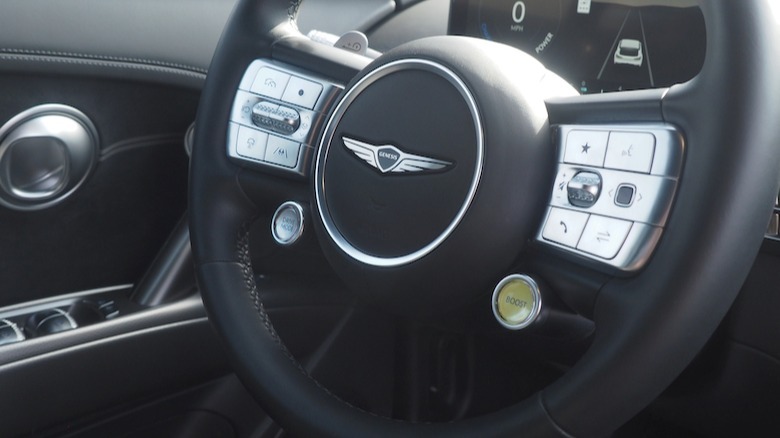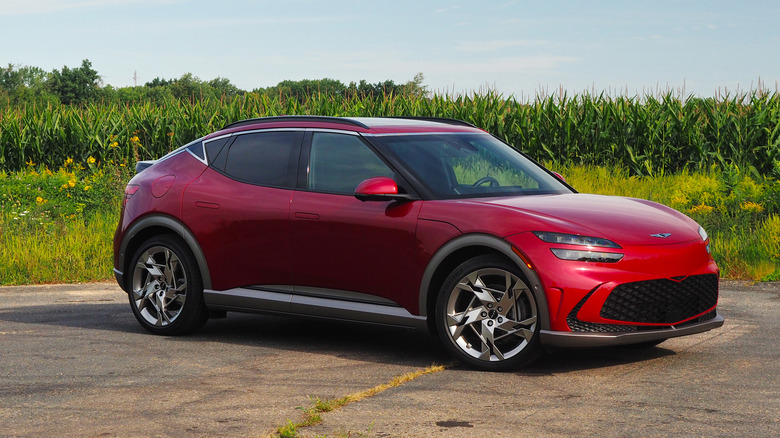2023 Genesis GV60 Review: Lessons In Electric Luxury
- Handsome styling
- Enthusiastic electric drivetrain
- High-quality cabin with healthy equipment levels
- Standard tires don't live up to the power
- Range could be better
- Limited availability in U.S.
If there's a theme in the luxury car segment right now, it might just be "overlook Genesis at your peril." Hyundai's luxe arm may or may not be a household name at this point, but once you've explained that Genesis is to the South Korean automaker what Lexus is to Toyota, and Acura to Honda, it's no great mental leap to combine attention to detail and lashings of tech with aggressive pricing.
We've seen how compelling that leaves sedans, SUVs, and crossovers. Now, Genesis is turning its attention to full electrification. The 2023 GV60 isn't its first EV, but unlike the Electrified G80 it's no conversion from what was originally an internal combustion car.
Instead, the GV60 taps the Hyundai Electric Global Modular Platform (E-GMP), just like the Ioniq 5 and the Kia EV6. It's an architecture specifically designed for electric vehicles, and Genesis' first outing on that underpinning. As you might expect, though, it also carries a bigger price tag and more equipment to suit the compact luxury crossover segment.
Shared platform but distinctive styling
The platform may be shared, but Genesis, Hyundai, and Kia's designers have worked hard to make sure the three EVs aren't going to be mistaken for each other. The Ioniq 5's oversized-hatchback aesthetic is markedly different from the crossover-wagon silhouette of the EV6. In fact, the GV60 is arguably the most obvious "small SUV" of the trio.
It lacks the traditional Genesis shield grille, skipped because the cooling requirements of all-electric vehicles are different from their "big gas engine relying on combustion under the hood" ICE counterparts. Instead, there's an oversized lower fascia — albeit with only a small portion of which that's actually open — and the familiar double-whisker headlamps, here filled with a total of twenty individual LED projectors.
The roofline is swoopy, with an interesting kink to the chrome in the D-pillar. I like Genesis' 21-inch alloy wheels — part of the GV60 Performance trim — which follow in the automaker's tradition of complex, almost fractal-like design. Contrast lower body cladding looks great against this Mauna Red paint, a $575 option.
At the rear, that cladding adds a little visual interest to what's an even more sparse trunk design than that of the larger GV70 SUV. An integrated spoiler breaks up the view through the rear glass.
A simple pricing strategy
I suspect it'll be, overall, a less controversial design than the EV6. I also think it'll date less rapidly than the Ioniq 5. Like the Kia, Genesis has used pop-out door handles to improve aerodynamics, but unlike both its stablemates there's a significantly simplified trim walk that really just gives you two options, and then your pick of Genesis' color chart.
In the U.S., pricing kicks off at $59,290 (plus $1,095 destination) for the 2023 GV60 Advanced AWD. As the name suggests, all-wheel drive — using a dual motor system, one for each axle — is standard. Genesis does offer a rear-wheel drive version of the GV60, with a single motor, in some regions, but not here.
My review car was the Performance AWD trim, starting at $68,290, and clocking in at $69,560 with the fancier paint and destination. It, too, has dual motors, but it sacrifices a little range in favor of extra get-up-and-go.
Performance good, range could be better
In Advanced AWD form, you're looking at 314 horsepower and 446 lb-ft of torque, with a rear-axle bias. EPA range is 248 miles, for a combined 95 MPGe, from the standard 77.4 kWh battery.
Step up to the GV60 Performance AWD, meanwhile, and you're looking at 429 horsepower and 516 lb-ft of torque; Genesis uses identical motors on the front and rear axles. Range drops, slightly, to 235 miles on the EPA cycle, and 90 MPGe combined, though I was on track to beat those numbers by 10-15 miles.
Either way, it leaves the GV60 with the least range of the E-GMP set. The Ioniq 5 AWD Long Range (with the same 77.4 kWh battery) gets a 256-mile rating, while the EV6 AWD Long Range pulls further ahead with 274 miles.
There are, then, rival electric crossovers that will go further, though Genesis' offering is competitive for its particular segment. Audi's new Q4 e-tron, for example, is rated for 236 miles in dual-motor Q4 50 form, or 242 miles for the Sportback version. Volvo's C40 Recharge only manages 226 miles.
Thumb the Boost
Neither Audi nor Volvo offers the power of the GV60 Performance, however, and that's where things get interesting. Instantaneous torque is one of the huge advantages from EVs, and the Genesis surges forward with an eagerness that's delightful. You can, in fact, get the tires to break traction fairly easily with a heavy right foot from a standing start.
Generally, though, this is all good clean fun. Straight-line acceleration is brisk, but the Performance trim's electronically controlled suspension manages to dial out the body roll you might expect in the corners. In fact, the GV60 does an impressive impersonation of a hot hatch.
Thumb the lime green "BOOST" button on the steering wheel, and you get 10 seconds of extra power: 483 horses instead of the usual 429. It's a fun trick for overtaking, or just for when a suddenly interesting road opens up ahead. A button on the opposite wheel spoke snicks the EV through its various drive modes, while paddles adjust the levels of regenerative braking intensity.
Speedy at the socket
That can go all the way down to one-pedal driving, or sufficiently reticent for gliding on the highway. The GV60 is swift, but it feels just as convincing as a luxury car. In Comfort mode, the adaptive suspension on the Performance trim is supple and avoids crashiness on all but the worst of the Michigan asphalt I was faced with. Active noise control helps keep things impressively hushed.
As for topping up the battery, locate a 350 kW DC fast charger you're looking at around 18 minutes to go from 10% to 80%. Faster indeed than the Electrified G80, though that has a bigger battery to fill. As with the bigger sedan, it's worth noting that Genesis isn't actually using all of that 350 kW, but it's still worth hunting one down as the GV60 will max out what a 150 kW charger is capable of delivering.
At home, meanwhile, you're looking at an overnight charge on a Level 2 charger. The heat pump Genesis includes as standard on the Electrified G80 is absent, here, worth noting if you live in a state where cold winters are the norm. It's something Polestar offers as an option on its not-quite-a-crossover Polestar 2.
A distinctive, well-made cabin
Inside the GV60, it's clear the cabin designers were feeling even more liberated than the exterior team. Genesis' usual high levels of quality and attention to detail are present and correct, but it's a more stylized — dare I say fashionable — presentation of that.
The steering wheel manages to look like an oversized bow tie, while the center console and HVAC controls are rounded pods. It definitely feels more youthful than Genesis' other cars, but for the most part, it works because of the materials: you still get Nappa leather, aluminum, and microfiber suede. Only some more mundane plastics on the door trim feel a little closer to Hyundai than what we've seen elsewhere in Genesis' range.
The most entertaining part has to be the motorized transmission control, though, which presents itself as a glowing glass orb in the center console when you get into the car. Hit the power button and it rotates 180 degrees, revealing the drive mode knob itself. Turn the GV60 off, and it thrums back around. Necessary? Absolutely not. Oddly charming? You bet.
Plenty of tech for your money
Performance trim gets a high level of equipment, including heated and ventilated front seats, a heated steering wheel, and heated rear seats. There are twin 12.3-inch displays atop the dashboard, plus a head-up display. The trunk — a healthy 24 cu-ft with the rear seats up, or 54.7 cu-ft with them down — is motorized, with a hands-free trigger, and there's a useful 110V outlet under the rear bench.
Genesis' infotainment system can look a little overwhelming at first glance, with lots of tiles, but it's fairly straightforward after a little acclimation. Apple CarPlay and Android Auto are standard — sadly both wired, not wireless — as is wireless phone charging, and the Performance trim gets a Bang & Olufsen audio upgrade too. New EV-specific menus show things like maximum range if you dial back the comfort settings, along with the location of the nearest public charger.
As well as using your smartphone as a key, the GV60 also supports biometric access. There's facial recognition outside, and a fingerprint sensor inside, allowing you to unlock the crossover and start it up without the traditional key.
2023 Genesis GV60 Verdict
There is, in short, a whole lot here to like. The GV60 feels more premium than the Volvo, has more tech than the Polestar, and plenty more punch than the Audi. A Model Y will beat it handily on range but doesn't feel anywhere as special inside. Porsche's upcoming electric Macan may end up being the most direct competitor here, though we'll have to wait to hear pricing to know for sure.
At the moment, the challenge remains the same as with the Electrified G80: availability. Supplies of the 2023 GV60 are miserly, Genesis warns, and it's only offering the EV in select U.S. states at present. If you're not in Arizona, California, Connecticut, New Jersey, Nevada, New York, Utah, or Washington, right now you can forget about it.
That's a shame, a huge shame, because the GV60 is a deeply impressive electric crossover. Distinctive, even playful in places, but without forgetting the all-important trifecta of performance, range, and charging. If Genesis could build enough of them it would have a bonafide hit on its hands; instead, it'll just be a lucky few who get to see this latest evidence of the automaker's rising star.
